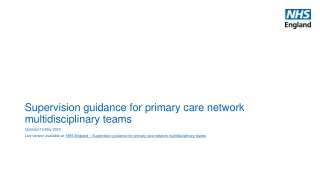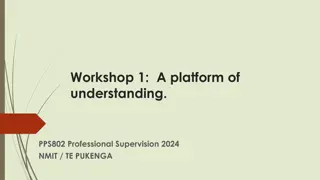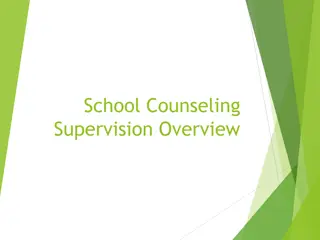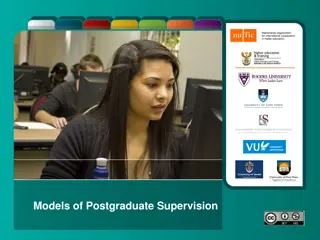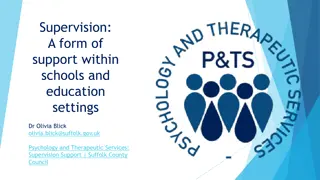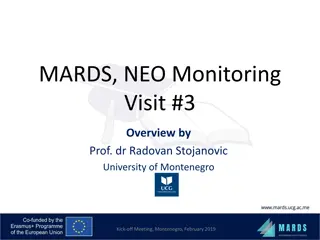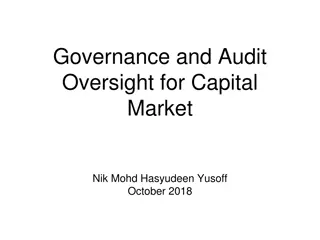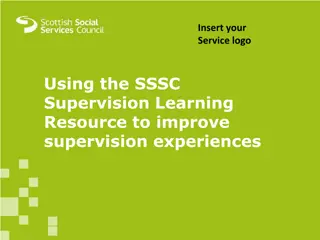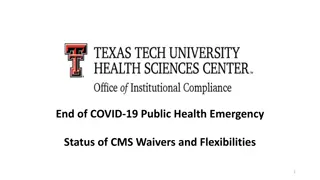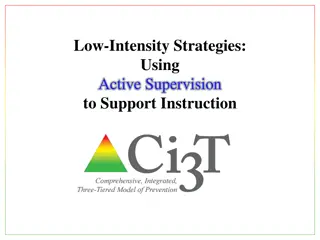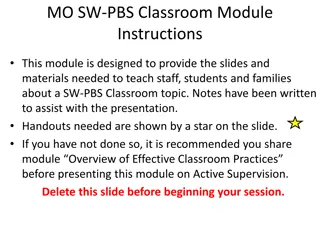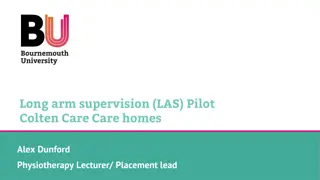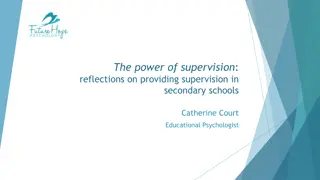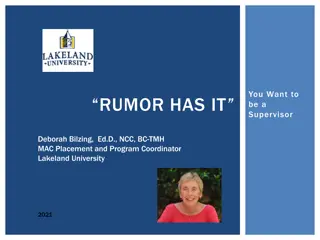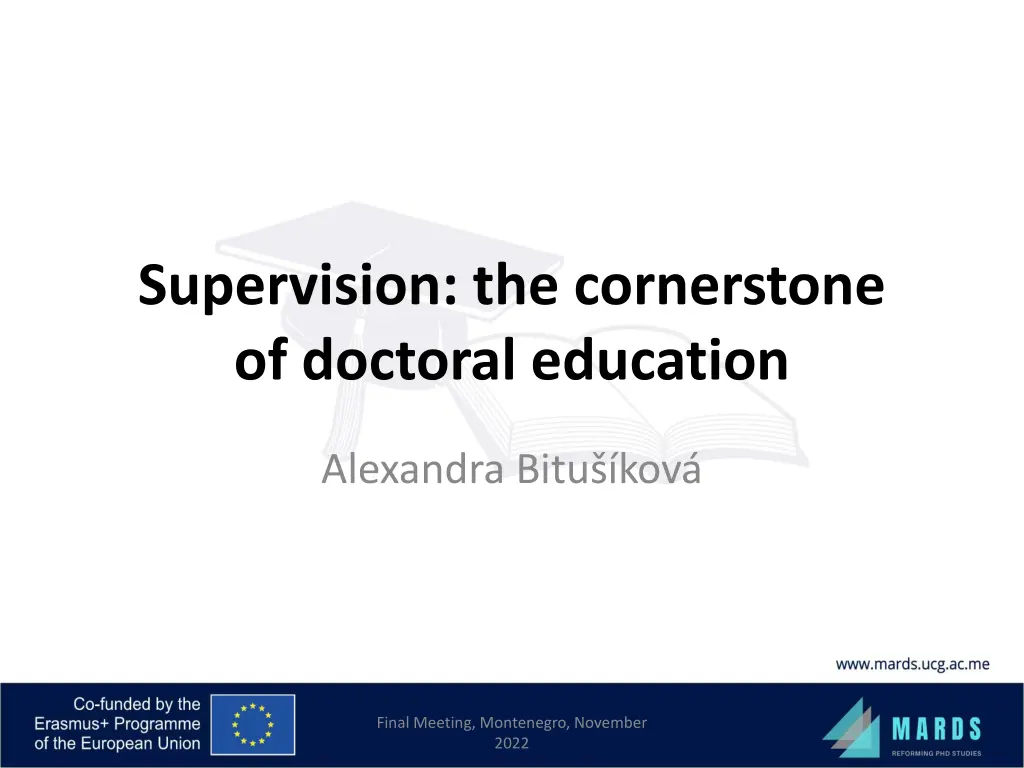
Supervision in Doctoral Education: Trends, Challenges, and Professional Development
Explore the evolution of doctoral supervision, from the core principles in doctoral training to the current focus on professionalization and new challenges. Understand the importance of training for supervisors, the shift towards co/team supervision, and the impact on doctoral education quality. Gain insights into the changing roles, responsibilities, and pedagogies in supervision practices.
Download Presentation

Please find below an Image/Link to download the presentation.
The content on the website is provided AS IS for your information and personal use only. It may not be sold, licensed, or shared on other websites without obtaining consent from the author. If you encounter any issues during the download, it is possible that the publisher has removed the file from their server.
You are allowed to download the files provided on this website for personal or commercial use, subject to the condition that they are used lawfully. All files are the property of their respective owners.
The content on the website is provided AS IS for your information and personal use only. It may not be sold, licensed, or shared on other websites without obtaining consent from the author.
E N D
Presentation Transcript
Supervision: the cornerstone of doctoral education Alexandra Bitu kov Final Meeting, Montenegro, November 2022
Context (matters) Back to Salzburg Principles I (2005): I. The core component of doctoral training is the advancement of knowledge through original research V. The role of supervision and assessment is crucial Since 2005 major changes in doctoral education: Trends towards structured programmes and doctoral schools (institutionalisation rules, guidelines, organised skills training) Diversification of the population of doctoral candidates (international, ethnicity, gender, age, fulltime/part time/ distant) New purpose (instead of reproducing academics - human capital for knowledge based economies and societies Changing roles and responsibilities of supervisors as a result Final Meeting, Montenegro, November 2022
Supervision today Shift towards professionalisation of supervision (system and structure in all procedures, rules and guidelines; new professionals in doctoral education highly skilled non- academic staff) Professional development for supervisors (comprehensive supervisor training) Changing pedagogy (from Master-apprentice relationship towards co-supervision or team supervision; doctoral candidate seen not as a student, but a young professional early stage researcher) Supervision culture Final Meeting, Montenegro, November 2022
Why training for supervisors? New changes and challenges require new ways of supervision To gain knowledge on new trends in doctoral education and in supervision To share experience among senior and junior supervisors with the aim to improve supervision and quality of doctoral education at the institutional level To develop as a professional and an individual (lifelong learning) Career progression (Melita: to be a professor is not enough to be a supervisor or?) Final Meeting, Montenegro, November 2022
Why co/team supervision? Good practice and a challenge Common practice at many universities Reasons for the shift towards co/team supervision: more inter/trans/multidisciplinary research, more pressure on candidates in terms of time, publishing, presenting need for more guidance of various kinds) However, co/team supervision requires good management challenges: Unclear roles of supervisors (who is the main one; local and external...) Challenges of intellectual diversity across disciplines (e.g.supervisors disagree on the theoretical approach and fight with each other Crucial to discuss co/team supervision from the start Final Meeting, Montenegro, November 2022
Roles of supervisor by tasks and responsibilities Expert/ active researcher Manager Mentor Coach Evaluator Facilitator Adviser Sponsor Critic Teacher/ trainer Examiner/reviewer Boss Friend Brentel 2018 Psychologist (my addition) Final Meeting, Montenegro, November 2022
Importance of the initial phase Building a good supervisor-candidate relationship Introduction to institutional guidelines and procedures (welcome package, induction days, resources, access to library, ethics guidelines) Clarification of mutual expectations https://graduatedivision.ucmerced.edu/sites/graduatedivision.ucmerc ed.edu/files/page/documents/expectation_scales.pdf Agreement on meetings (frequency, written records, structure and objectives...) Doc. project planning, objectives, timetable, milestones Monitoring, feedback Final Meeting, Montenegro, November 2022
Mid-phase Data collection and analysis key research phase Writing publications (thesis chapters) important to keep writing (supervisor helps to identify good journals, reviews the candidate s drafts) Conference presentations (supervisor s role is to open door to professional networks, to encourage candidate to actively participate in workshops/conferences at home and abroad) Mobility abroad (?) Monitoring, feedback Final Meeting, Montenegro, November 2022
Final phase Focus on dissertation writing and finalising Supervisor: reviewing dissertation draft step by step: critical feedback is crucial In case of co-supervision or interdisciplinary research: both/all supervisors should discuss the draft dissertation in advance in order to avoid disagreement during the defence Submitting the dissertation Preparation for public defence Final Meeting, Montenegro, November 2022
Who are the best supervisors? According to surveys, doctoral candidates value a supervisor who is: accessible (has time and capacity to meet) approachable (supervisor creates a pleasant and friendly environment the candidate does not have fear to express his/her problems or doubts) encourageing (supporting, motivating and inspiring) interested (supervisor is interested not only in results, but in knowing the doctoral candidate as a person) open and flexible (supervisor is open to discuss problems and to adapt to changing needs of the candidate) professional (supervisor is an expert and active researcher in the doctoral topic s/he helps the candidate in networking) supportive (supervisor supports the candidate in his/her personal and career development, can recognise and help with crises) Final Meeting, Montenegro, November 2022
Summary Doctoral supervision today is a serious and challenging task that requires many more responsibilities than in the past First, good supervision is based on active research of the supervisor and inclusive research environment Second, good supervision includes taking care also of other than research challenges (incl. life-work balance and well-being) Training for new supervisors should become a norm and a must Final Meeting, Montenegro, November 2022
Recommended sources Brentel, H. 2018. Doctoral supervision. Handbook for establishing a productive and supportive supervision culture. Frankfurt am Main/ N rnberg: KDD Gatfield, T. and Alpert, F. 2002. The supervisory management styles model. In: Good, A., Herrinmgton, J. and Northcote, M. (eds.): Proceedings of the 2002 Annual International Conference of the Higher Education Research and Development Society of Australasia. Perth: Higher Education Research and Development Society of Australasia. Lategan, L. O. K. (ed.). 2008. An introduction to postgraduate supervision. Stellenbosch: Sun Press. Lee, A. 2012. Successful research supervision. London New York: Routledge. Taylor, S. and Beasley, N. 2005. A Handbook for supervisors. London -New York: Routledge.
THANK YOU VERY MUCH Final Meeting, Montenegro, November 2022

